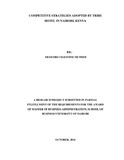| dc.description.abstract | This chapter consists of the research methodology that will be used in the study. This
includes the research design, data collection methods and data analysis. The research
was a case study of Tribe Hotel. The study used primary data which was collected
through face to face interview with the researcher. An interview guide was used to
collect data from the Tribe Hotel. Content analysis was used to analyze the data since
that nature of the data was qualitative. The information was analyzed and evaluated to
determine their usefulness, consistency, credibility and adequacy of the content
analysis. The study further concluded that Tribe Hotel adopted a number of strategies
to gain competitive ability for instance human resource practices as part of the
strategy to achieve competitive advantage through workforce identification
requirements in hiring qualified and experienced employees who were competent to
take up the job. Tribe Hotel also adopted the use of information technology to achieve
competitive advantage. This was a marketing strategy done using the internet
highlighting the range of products and services through electronic commerce (ecommerce).
The study recommended that Tribe hotel should focus on relationship
marketing, is more personal in the sense, it not only creates and maintains guests, but
also builds a strong bond or relationship with the guests for now and the future. The
driving force for the development of relationship marketing over traditional marketing
has come from better quality services combining potential benefits for the hotel and
the guests. This strong bond is possible only when the hotel is in constant and
continuous touch with the customer, with the result such constant and continuous
contact results in customer value which in turn enables the hotel to find out more
ways to develop and foster better values. The study further recommends that Tribe
Hotel should be in constant touch with the corporate travelers, both personally and
emotionally, since emotional participation satisfies the behavioral part of the guest.
All accommodation providers, who want to market for this segment successfully to
achieve good yield per room occupied, will have to consider these aspects carefully,
and deliver the same to the utmost satisfaction of their guests. | en_US |

